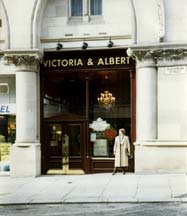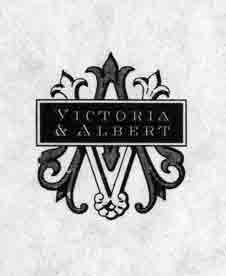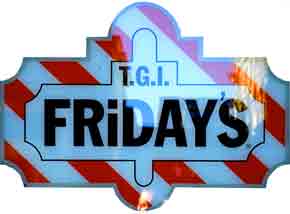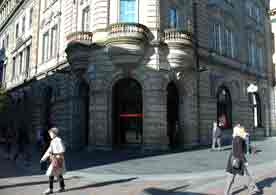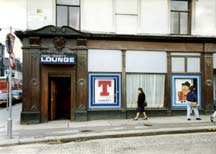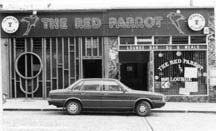260 Buchanan Street, corner of 430-36 Parliamentary Road.
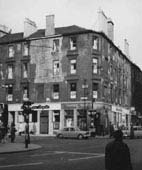
Stevenson Taylor.
There has been a pub on this site since 1842. The owner Michael Johnston was licensee until the mid 1850s. However it was not until 1857 that Wine and Spirit Merchant Robert Stevenson took over the pub. He was living at 22 Charlotte Street near the Barras in the East End of the city. Mr Stevenson prospered and by 1870 he was trading from 106 Cowcaddens, 104 Norfolk Street, 67-71 Bridge Street and 260 Buchanan Street. Robert traded under the title of Robert Stevenson until 1881 when the title changed to Stevenson Taylor & Co.,.
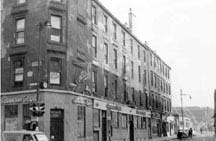
Stevenson Taylor’s corner of Parliamentary Road.
Henry Taylor was granted a certificate in April 1882 for premises at 260 Buchanan Street, Stirling Street, Govan Street, South Wellington Street, Bridge Street and St. Vincent Street, a massive company in those days.
In 1937 Henry Holland Taylor was the licensee and traded under the title of Robert Stevenson Taylor & Co.
The Buchanan Street premises were run by William Brownlee in 1960 before Matthew E Taylor took over in the late 60’s. Matthew E Taylor lost his licence for under-age drinking in 1970.
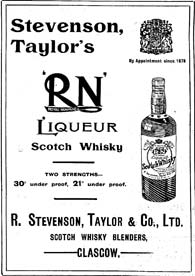
Advert for Stevenson Taylor’s Royal Nonpareil Liqueur Whisky. 1925.
The News in 1970…
Two Glasgow Licences Axed
Magistrates “Perturbed” About Increase In Offences
The drive against under-age drinking again provided the drama at Glasgow Licensing Court when the magistrates withdrew the licences of two well-known city premises after police complaints.
The premises were Stevenson Taylor (Glasgow) public house at the corner of Parliamentary Road and Buchanan Street and the Stirrup public house and restaurant at 1055-1061 Sauchiehall Street.
In both instances, the Chief Constable, Sir James Robertson, objected that the premises were not being conducted in a proper manner. He said that in the Stevenson Taylor premises there had been three cases of under-age drinking involving a youth of 15 and 17 year old youths. The youths were later convicted.
In objecting to the renewal of the licence for the Stirrup, Sir, James lodged seven complaints, including two of under-age drinking. The youths concerned aged 15 and 16, were also later convicted. The licensees themselves had not been prosecuted.
The court refused to renew the licence for the Stirrup, held by Mrs. Helen Bryden. As regards to the Stevenson Taylor premises, an application was put before the court for the transfer of the licence from Mr. William Brownlee to Mr. Matthew E Taylor. The court refused the transfer application and also refused renewal of the licence.
Mr. Hugh T McCalman, solicitor, appearing for Mr. Brownlee and Mr. Taylor, pointed out that Mr. Brownlee had been given no opportunity to defend himself in connection with the complaints and said it was wrong to deal with a man as though he had been convicted.
It is a complete defence to the licence-holder to prove that he had no reason to believe that the persons served were under 18, said Mr. McCalman. had Mr. Brownlee been prosecuted, this defence would have been available to him.
Mr. McCalman added that because of the matter in which the police enquired were conducted, Messrs., Stevenson Taylor had been unable to find out which member of their staff had supplied the drink.
Explaining the steps the firm had taken in an attempt to prevent under-age drinking, Mr. McCalman said that in all their shops notices are displayed concerning under-age drinking, and that there are notices in the windows to the effect that anyone under the age of 21 will not be permitted entry.
Mr. McCalman also told the court that the premises concerned had been in the Taylor family for over 100 years and that at no time had there been a licensing prosecution. Asking for the licence to be renewed and for its transfer to Mr. Taylor, Mr McCalman said that the firm of Stevenson Taylor was owned by the trustees of the late Edward Taylor, and in order to wind up the trust they were disposing of the assets.
Mr McCalman also explained that Mr. Matthew E Taylor had acquired the business from Messrs. Stevenson Taylor and that Mr. Brownlee, secretary of the firm, concurred in the transfer. Mr. Brownlee deeply regretted the complaint, coming as it did when his connection with the firm was being severed.
In all, the police objected to 23 applications, mainly to renewals of licences. Several of the complaints related to the supply of drinks out-with permitted hours.
Bailie McCredie, the magistrate, commented that the magistrates were perturbed by the increase in the number of offences in licensed premises. This, he said, tended to show a lack of supervision. He warned: In future, a more serious view will be taken of all such offences. We are concerned about incidents which happen where licensees are on the premises. Earlier, Bailie McCredie said that during the past year several employees had been convicted for selling short measures. Licensees, he said must install automatic measures and forbid their employees to use open measures.

